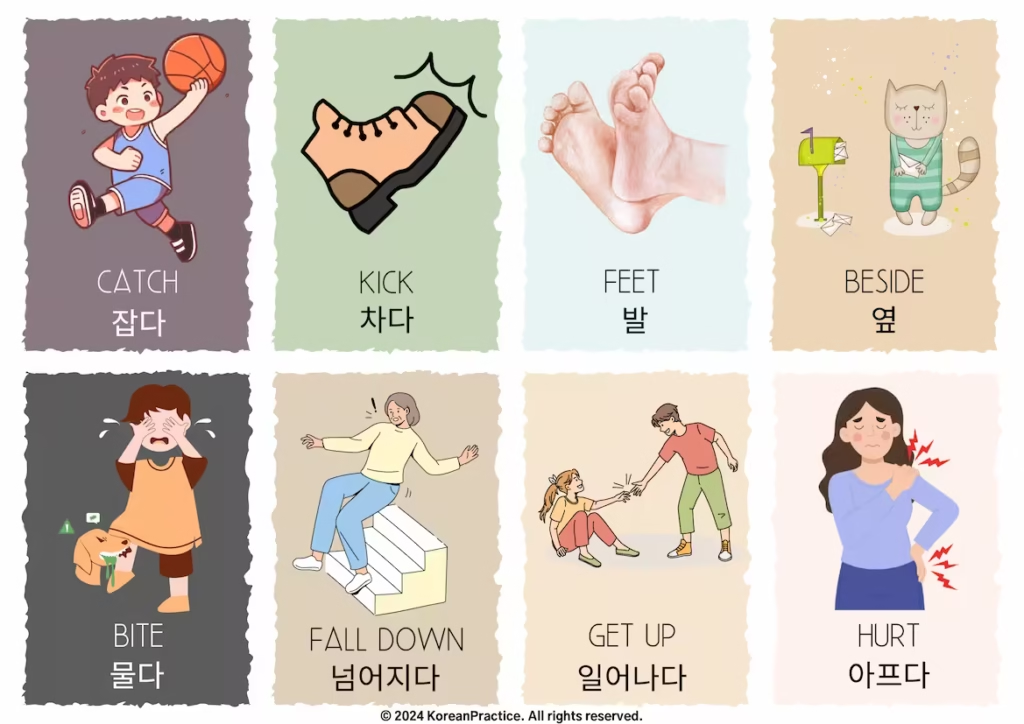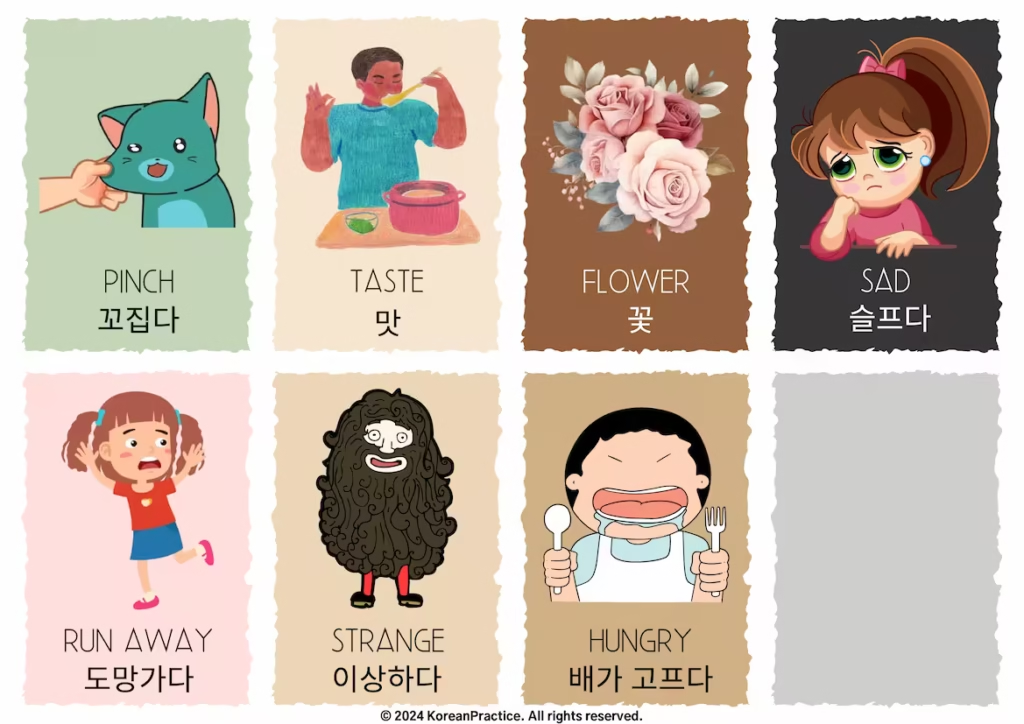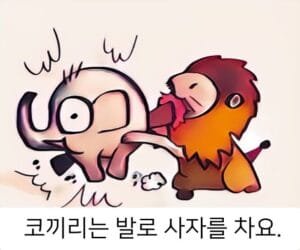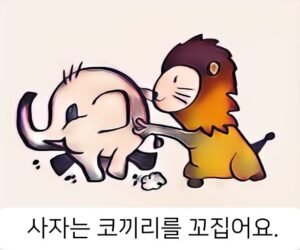
Episode 5 The Lion's Attack
The lion and the elephant face off in a fierce and surprising battle.
Step 1: Story Vocabulary (Episodes 5 & 6)
Here are some key words from Episodes 5 and 6 you’ll hear in today’s story. You don’t need to memorize them—just take a quick look!


Step 2: Episode 5 Listening
Before studying, listen once to get the feeling of the story.
After you finish the lesson, come back and listen again—you’ll understand much more!
Step 3: Story Time!
Let’s see what happens in today’s adventure. Read slowly and enjoy each sentence!
🟡 Sentence 1 of 7
🚀 Quick Learning

Original Korean Sentence
사자가 코끼리를 잡아요.
Pronunciation Guide
사자가 (sa-ja-ga) 코끼리를 (ko-ggi-ri-reul) 자바요 (ja-ba-yo).
English Translation
The lion catches the elephant.
Literal Translation
Lion catch elephant.
Quick Reference
사자가 (lion) 코끼리를 (elephant) 잡아요 (catch).
💡 Need more details? Click “Deep Learning” below!
🔍 Deep Learning
Meaning and Context
사자 (lion)
→ The lion — the one taking action now in the story.
가 (subject marker)
→ Points out that the lion is doing the action.
코끼리 (elephant)
→ The one the action is done to.
를 (object marker)
→ Shows that the elephant is the object being caught.
잡 (to catch, grab, take)
→ The action — the lion catches or grabs the elephant.
아요 (polite ending)
→ I’m telling you this in a polite and friendly way.
Real-Life Usage
잡아요 is common when talking about catching or holding something.
Pattern Practice
1. 사자가 토끼를 잡아요.
2. 고양이가 쥐를 잡아요.
3. 아이가 공을 잡아요.
4. 강아지가 공을 잡았어요.
🟡 Sentence 2 of 7
🚀 Quick Learning

Original Korean Sentence
사자가 코끼리를 물어요.
Pronunciation Guide
사자가 (sa-ja-ga) 코끼리를 (ko-ggi-ri-reul) 무러요 (mu-reo-yo).
English Translation
The lion bites the elephant.
Literal Translation
Lion bite elephant.
Quick Reference
사자가 (lion) 코끼리를 (elephant) 물어요 (bite).
🔍 Deep Learning
Meaning and Context
사자 (lion)
→ The lion — now it takes a stronger action in the story.
가 (subject marker)
→ Points out that the lion is doing this action.
코끼리 (elephant)
→ The one being acted on — our elephant friend.
를 (object marker)
→ Shows that the elephant is the object of the action.
물 (to bite)
→ The action — the lion is biting the elephant.
어요 (polite ending)
→ I’m telling you politely and gently.
Pattern Practice
1. 아기가 사과를 물어요.
2. 강아지가 내 손을 물어요.
3. 고양이가 장난감을 물어요.
4. 새가 열매를 물어요.
🟡 Sentence 3 of 7
🚀 Quick Learning

Original Korean Sentence
코끼리는 아파요.
Pronunciation Guide
코끼리는 (ko-ggi-ri-neun) 아파요 (a-pa-yo).
English Translation
The elephant is in pain.
Literal Translation
Elephant is painful.
Quick Reference
코끼리는 (elephant) 아파요 (is painful).
🔍 Deep Learning
Meaning and Context
코끼리 (elephant)
→ Our elephant — now feeling the result of the lion’s action.
는 (topic marker)
→ Highlights the elephant as the topic of this sentence.
아프 (to be painful / hurt)
→ Describes how the elephant feels now.
아요 (polite ending; is)
→ I’m telling you polite and friendly.
Pronunciation Flow Tip
⊳ 아프 + 아요 = 아파요: When rapidly pronounced, ‘프’ and ‘아’ naturally combine to form ‘파’, not 아프아요.
Real-Life Usage
아파요 can describe both physical pain and emotional hurt. You might hear it often if someone is unwell
Grammar
The ending 아요 doesn’t mean “is” on its own — it isn’t the same as is in English. But because it works together with the verb like a be verb (helping express a state in the present), I wrote it as is to make it easier to understand.
Pattern Practice
1. 아이가 아파요.
2. 할아버지가 아파요.
3. 마음이 아파요.
4. 다리가 아파요.
🟡 Sentence 4 of 7
🚀 Quick Learning

Original Korean Sentence
코끼리는 발로 사자를 차요.
Pronunciation Guide
코끼리는 (ko-ggi-ri-neun) 발로 (bal-ro) 사자를 (sa-ja-reul) 차요 (cha-yo).
English Translation
The elephant kicks the lion with its foot.
Literal Translation
Elephant kick lion with foot.
Quick Reference
코끼리는 (elephant) 발로 (wit its foot) 사자를 (lion) 차요 (kick).
🔍 Deep Learning
Meaning and Context
코끼리 (elephant)
→ The elephant, now fighting back.
는 (topic marker)
→ I’m focusing on the elephant’s action.
발 (foot)
로 (with)
→ Shows the means — the foot is what’s doing the kicking.
사자 (lion)
→ The lion is the target of the kick.
를 (object marker)
→ Marks the lion as the object of the action.
차 (to kick)
→ The action the elephant is doing.
아요 (polite ending)
→ I’m telling you this polite and friendly.
Pronunciation Flow Tip
⊳ 차 + 아요 = 차요: When rapidly pronounced, ‘차’ and ‘아’ naturally combine to form ‘차’, not 차아요.
Pattern Practice
1. 아이는 공을 발로 차요.
2. 강아지가 문을 발로 차요.
3. 오빠는 쓰레기통을 발로 차요.
4. 내 친구가 돌을 발로 차요.
🟡 Sentence 5 of 7
🚀 Quick Learning

Original Korean Sentence
사자는 넘어져요.
Pronunciation Guide
사자는 (sa-ja-neun) 너머져요 (neo-meo-jyeo-yo).
English Translation
The lion falls down.
Literal Translation
Lion fall down.
Quick Reference
사자는 (lion) 넘어져요 (fall down).
🔍 Deep Learning
Meaning and Context
사자 (lion)
→ The lion, after being kicked by the elephant.
는 (topic marker)
→ Now I’m focusing on the lion and what happens to it.
넘어지 (to fall down)
→ The action — the lion loses its balance and falls.
어요 (polite ending)
→ I’m telling you polite and friendly.
Pronunciation Flow Tip
⊳ 넘어지 + 어요 = 넘어져요: When rapidly pronounced, ‘지’ and ‘어’ naturally combine to form ‘져’, not 넘어지어요.
Pattern Practice
1. 아이는 넘어져요.
2. 아기가 넘어졌어요.
3. 사람이 넘어졌어요.
4. 건물이 넘어져요.
🟡 Sentence 6 of 7
🚀 Quick Learning

Original Korean Sentence
사자는 일어나요.
Pronunciation Guide
사자는 (sa-ja-neun) 이러나요 (i-reo-na-yo).
English Translation
The lion gets up.
Literal Translation
Lion get up.
Quick Reference
사자는 (lion) 일어나요 (get up).
🔍 Deep Learning
Meaning and Context
사자 (lion)
→ The lion, after falling down, is now getting up.
는 (topic marker)
→ I’m focusing on the lion’s action in this part of the story.
일어나 (to get up)
→ The action — the lion rises from the ground.
아요 (polite ending)
→ I’m telling you politely, as if sharing the story with warmth.
Pronunciation Flow Tip
⊳ 일어나 + 아요 = 일어나요: When rapidly pronounced, ‘나’ and ‘아’ naturally combine to form ‘나’.
Pattern Practice
1. 아들이 일어나요.
2. 아기가 일어나요.
3. 저는 일어났어요.
4. 누나가 일어났어요.
🟡 Sentence 7 of 7
🚀 Quick Learning

Original Korean Sentence
사자는 코끼리를 꼬집어요.
Pronunciation Guide
사자는 (sa-ja-neun) 코끼리를 (ko-ggi-ri-reul) 꼬지버요 (ggo-ji-beo-yo).
English Translation
The lion pinches the elephant.
Literal Translation
Lion pinch elephant.
Quick Reference
사자는 (lion) 코끼리를 (elephant) 꼬집어요 (pinch).
🔍 Deep Learning
Meaning and Context
사자 (lion)
→ The lion — now doing something new to the elephant.
는 (topic marker)
→ I’m focusing on the lion’s action here.
코끼리 (elephant)
→ The one receiving the action.
를 (object marker)
→ This shows that the elephant is the target of the action.
꼬집 (to pinch)
어요 (polite ending)
→ I’m telling you polite and friendly.
Pattern Practice
1. 동생이 저를 꼬집어요.
2. 아이가 친구를 꼬집어요.
3. 고양이가 꼬리를 꼬집어요.
4. 나는 팔을 꼬집었어요.
Great job! Now listen to the story one more time—you’ll catch so much more this time.